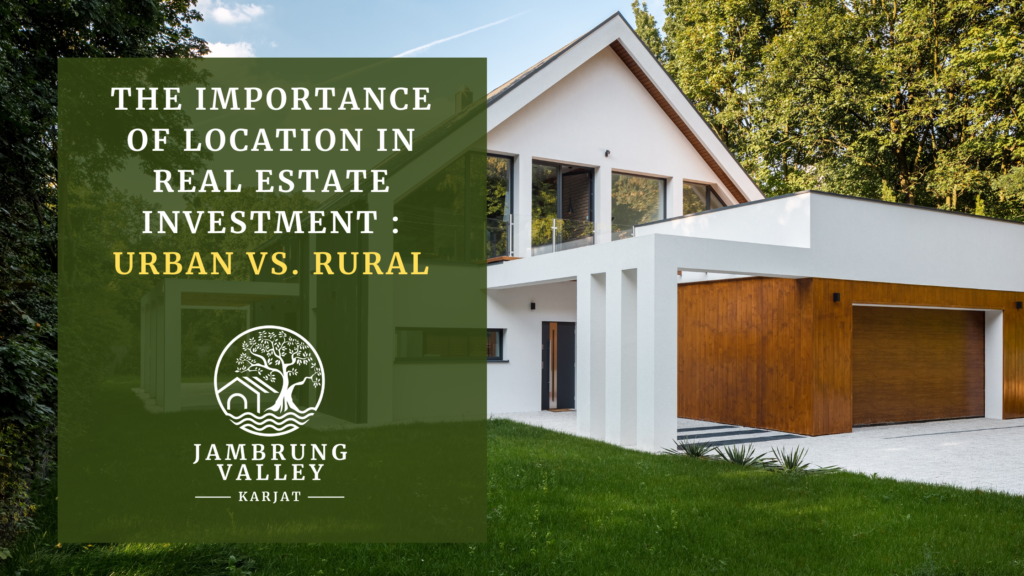
When it comes to real estate investing, few factors are as influential as location. The right location can significantly impact the success of an investment, making it essential to understand its importance. In this article, we’ll delve into why location matters in real estate, key considerations when choosing a location, and valuable insights for investors, homeowners, and real estate agents alike.
Why Location is Key in Real Estate Investment.
Location is a critical element in real estate investing for several compelling reasons:
- Property Value
The value of a property is heavily influenced by its location. Properties situated in desirable areas tend to appreciate more rapidly and retain their value better during economic downturns.
- Income Potential from Vacation Villas
Properties in prime locations can command higher prices, leading to better cash flow and a stronger return on investment. This makes the location a crucial consideration for those looking to generate income from a vacation or second-home villa.
- Demand and Marketability
A property in a sought-after location is more likely to attract buyers, reducing vacancy rates and increasing the likelihood of a quick sale.
- Long-term Growth Opportunities
Investing in an area with strong growth potential can lead to substantial long-term gains. As neighborhoods develop and property values increase, the potential for significant returns becomes more pronounced.
Essential Factors When Selecting a Location for Investment
When choosing a location for real estate investment, it’s crucial to consider several key factors:
Local Economy and Employment Prospects
A robust local economy and strong job market are vital for attracting tenants and buyers. Look for areas with low unemployment rates, diverse industries, and population growth. Research major employers and upcoming developments that could create new job opportunities.
Neighbourhood Amenities and Lifestyle
The amenities and lifestyle offered by a neighborhood play a significant role in its desirability. Proximity to parks, shopping centers, and public transport can make a property more appealing to potential buyers. Additionally, consider the neighborhood’s overall atmosphere—is it family-friendly, trendy, or peaceful?
Safety and Crime Rates
Safety is a top priority for most people when choosing where to live. Investigate local crime rates and speak with residents or law enforcement to gauge the area’s safety. Properties in safer neighborhoods generally have higher property values and attract more reliable tenants.
Property Taxes and Insurance Expenses
Property taxes and insurance costs can vary greatly between locations. Higher taxes and premiums can reduce your cash flow and overall return on investment, so it’s important to factor these costs into your decision.
Future Development and Growth Potential
Investing in an area with strong growth prospects can lead to significant long-term returns. Research local development plans and zoning regulations to identify areas poised for growth. Look for signs of new construction, infrastructure improvements, and population increases.
Urban Real Estate Investment
Urban areas are known for their high demand and liquidity. Properties in cities generally offer higher rental yields due to the concentration of job opportunities, amenities, and public transportation. Urban investments often appreciate faster because of ongoing development and population growth. Additionally, the availability of services such as schools, hospitals, and entertainment options makes urban properties attractive to a broad range of buyers.
Rural Real Estate Investment
Rural properties offer different benefits. They are generally more affordable, allowing investors to acquire larger plots of land or multiple properties for the price of a single urban property. Rural areas often experience lower vacancy rates, especially if they are in popular vacation spots or near natural attractions. The slower pace of life and proximity to nature appeal to a growing number of people seeking a lifestyle change.
Why Urban Real Estate is a Smart Future Investment
Investing in real estate is a proven strategy for building wealth, and choosing the right location is crucial. Urban areas, with their dynamic economies and growing populations, offer excellent opportunities for future investment.
Advantages of Investing in Urban Real Estate
- Higher Property Appreciation
Urban properties tend to appreciate faster than those in rural areas. This is due to the constant demand for housing, and commercial spaces, and the continuous influx of people moving to cities for work and lifestyle opportunities. As cities expand and develop, property values rise, providing investors with strong returns over time.
- Infrastructure Development and Access
Urban areas are constantly evolving, with significant investments in infrastructure such as roads, public transportation, and utilities. These improvements enhance the quality of life for residents and increase the value of real estate in these areas. Additionally, the proximity to essential services, entertainment, and cultural activities makes urban properties more desirable.
Urban Real Estate: A Hedge Against Inflation
Real estate in urban locations serves as a solid hedge against inflation. As the cost of living increases, so do property values and rental rates. This ensures that your investment not only retains its value but also grows, providing financial security in the long run.
- Long-Term Benefits of Urban Investment
Investing in urban real estate is not just about immediate gains. The long-term benefits include stable income, consistent property appreciation, and the ability to leverage your property’s value for future investments. As urbanization continues globally, the demand for city properties is expected to grow, making urban real estate a reliable and lucrative investment choice.



